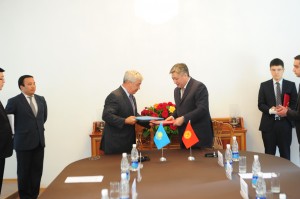 BISHKEK – Kazakh Foreign Minister Erlan Idrissov joined his counterparts from Kyrgyzstan, Tajikistan, Turkmenistan, Uzbekistan and Japan, July 16, to review 10 years of cooperation within the Central Asia+Japan dialogue. The group also discussed ways to develop and strengthen partnerships in the coming decade.
BISHKEK – Kazakh Foreign Minister Erlan Idrissov joined his counterparts from Kyrgyzstan, Tajikistan, Turkmenistan, Uzbekistan and Japan, July 16, to review 10 years of cooperation within the Central Asia+Japan dialogue. The group also discussed ways to develop and strengthen partnerships in the coming decade.
The agenda of the meeting included such issues as increasing cooperation to promote collaboration in the agricultural area, achieving sustainable development based on Millennium Development Goals, combating illicit drug trafficking, addressing the situation in Afghanistan and preventing natural disasters.
In his remarks to the gathering, Idrissov expressed gratitude to Japan for its active promotion of the Central Asia+Japan dialogue, which is considered an important tool to strengthen cooperation among the countries. He also drew attention to the need to continue the rapprochement and expansion of cooperation for peace and stability and improve the welfare of citizens in the region in an environment of increasing challenges and threats in Central Asia.
“In this context, Kazakhstan stands for the strengthening of the Central Asia plus Japan dialogue and the search within its framework of pragmatic and viable cooperation projects and mechanisms. Our activity is intended not only to create conditions for cooperation and to strengthen and develop economic relations, but also lead to the growth of sincere political trust and ultimately to create conditions [for security] on the vast part of the Asian continent,” Idrissov said.
During the meeting, the six ministers exchanged opinions on deepening cooperation in agriculture, which according to previous agreements was selected as a pilot area for closer cooperation among the participating states. The ministers agreed to implement specific agricultural projects. They also signed a joint statement at the outcome of the meeting covering a wide area of issues.
While in the city, Idrissov met with Japanese Minister of Foreign Affairs Fumio Kishida. The meeting focused on visits at the highest levels, prospects for further promotion of trade and economic cooperation, cooperation within multilateral diplomacy and a regular exchange of views on international issues.
Idrissov and Kishida noted the importance of the start of production of Toyota Fortuner cars in Kostanai and expressed hope that this will pave the way for other Japanese automakers. They also noted favourable prospects for further development of cooperation in the field of nuclear energy and the development of rare earth metals.
Speaking about the prospects for economic cooperation, Kishida expressed Japan’s support for reforms in Kazakhstan aimed at achieving the objectives of the Kazakhstan 2050 Strategy, noting specifically the possibility of Japanese participation in the development of small and medium-sized businesses.
The two ministers discussed the possibility of opening direct air services between Kazakhstan and Japan. They expressed hope that the introduction of a unilateral, visa-free regime in Kazakhstan for the citizens of Japan and nine other countries on July 15 will increase the flow of tourists and investors. Kishida assured Idrissov that Japan, in turn, will promptly consider the abolition of visa requirements for holders of diplomatic and service passports.
Idrissov officially invited Japan to participate in the international exhibition EXPO 2017 in Astana and expressed hope that Japanese companies that are known for their know-how and technologies in the field of new energy will take an active part in it.
The parties agreed to increase cooperation in the international organisations, such as the United Nations and UNESCO. At the same time, they highlighted the importance of the recent inclusion of the Great Silk Road objects both in Kazakhstan and Japan on the UNESCO World Heritage list.
They also considered the cooperation between Kazakhstan and the Organisation for Economic Cooperation and Development (OECD).
The Central Asi+Japan dialogue is a new form of cooperation initiated by Japan in 2004 to expand and strengthen ties with Central Asian countries as well as to increase regional cooperation. The dialogue has become an important platform for the discussion of issues related to the region’s political, economic and security challenges.
- Friday, 13 February, 2026
- Almaty 21 °F / -6 °C
- Astana -8 °F / -22 °C
